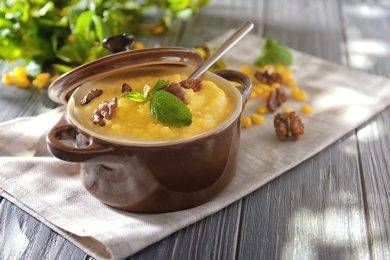You’ve been missing out if the only Caribbean and Jamaican food you can think of comes from 7-Eleven and rhymes with “chief chatty.” The multi-ethnic tropical islands renowned for international riches are famed for much drool-inducing Jamaican food and seasoning. Jerk, curry, and oxtail are just a few of the flavors that reflect the region’s long, tangled culture and identity, reclamation, and cross-cultural trade. Now, let’s talk about the history of Jamaican food and the must-try Jamaican seasonings.
History of Jamaican Cuisine
Jamaican food cuisine combines cooking methods, aromas, seasonings, and traditions from the region’s native groups and the Spaniards, British, Africans, Indians, and Chinese who have lived there. Crops imported to the area from tropical Southeast Asia also have an impact. Jamaican cuisine consists of a variety of foods influenced by the numerous cultures that arrived on the archipelago with the entrance of newcomers. Other recipes are unique or incorporate skills and traditions from different cultures. Many cuisines have been acquired and are currently cultivated in Jamaica. They have mastered these cuisines and served them in some local Jamaican restaurant and bars. In addition, there is a vast range of seafood, citrus fruits, and meat that may be readily available at your nearest neighborhood farmers market.
Must-Try Jamaican Food Seasoning
Curry
History
The term “curry” was first employed in British cuisine to describe meat meals (typically leftover lamb) cooked in a Western-style sauce flavored with curry powder. In 1747, Hannah Glasse published The Art of Cookery Made Plain and Easy, which included the earliest curry recipe in the United Kingdom. For seasoning “currey,” she used only black pepper and coriander seeds in the first version of her book. Curry is deeply ingrained in Jamaican culture, heritage, and cuisines. After abolishing slavery, Indian indentured workers were sent to the then English Colony to work on sugar cane plantations, bringing the spice to Jamaica in the 17th century.
Flavor
Curry powder spice combinations, such as garlic, cumin, paprika, cardamom, turmeric, and fenugreek, are commonly used to make Jamaican curry. However, they add allspice, which provides Jamaican curry its intense flavor and distinguishes itself from other curries.
Use
Curry powder is a versatile seasoning that may be used in a variety of dishes. Stews, soups, sauce, marinades, meats, and veggies are all widely flavored with it. As curry spice becomes increasingly popular, chefs come up with new ways to incorporate it into dishes like burgers, scrambled eggs, and potato salad. Try curry-flavored deviled eggs or curried chicken salad if you want to put that jar to good use.
Jerk
History
Although historians think that escaped Coromantee slaves originated Jamaican jerk flavor, researchers have discovered evidence that the indigenous Taino first-served jerk seasoning. During the Spanish invasion of Jamaica in 1655, enslaved Africans were freed and fled into the Jamaican countryside, where they mixed with the remnant Tainos and became the first Jamaican Maroons. The Taino, it appears, taught these escaped slaves how to do this.
Flavor
According to Jamaican culinary connoisseurs, allspice, Scotch bonnet peppers, and thyme are three crucial jerk spice elements. The spice berries, often known as “Jamaica pepper,” are unique to the island and have a deep, spicy flavor that tastes like nutmeg, cloves, and cinnamon combined.
Use
Jerk seasoning was initially used on Jamaican food entrees such as pork and chicken, but it’s also used with soy, salmon, prawns, oyster, steak, chorizo, lambs, goats, and veggies in current dishes.
Oxtail
History
The oxtail was defined as an ox’s tail. Jamaica’s cuisine culture is a synthesis of all the citizens that have lived on the island in ancient and modern times. The African one-pot cooking methods utilized by African slaves and maroons on the island as early as the mid-1500s reflect Jamaican oxtail seasoning.
Flavor
The ingredients of this seasoning are black pepper, garlic, onion, oregano, thyme, ginger, salt, sugar and, Jamaican pimento, which gives it a spicy and savory flavor.
Use
This seasoning is primarily used for beef and lamb. However, you can also use this to any other meat, and you can always season it to your liking. For example, it is used on oxtail dishes in which the bone marrow provides the majority of the flavor. This seasoning helps bring out the savory and the tastiness of the dish. It is also good to choose your meat wisely while you visit your local farmers market to get it fresh and new.
My name is Sardar Ayaz a professional content writer and SEO expert having Proven record of excellent writing demonstrated in a professional portfolio Impeccable grasp of the English language, including idioms and current trends in slang and expressions. I have ability to work independently with little or no daily supervision with strong interpersonal skills and willingness to communicate with clients, colleagues, and management.
I can produce well-researched content for publication online and in print, organize writing schedules to complete drafts of content or finished projects within deadlines. I have 12 years’ experience to develop related content for multiple platforms, such as websites, email marketing, product descriptions, videos, and blogs.
I use search engine optimization (SEO) strategies in writing to maximize the online visibility of a website in search results











